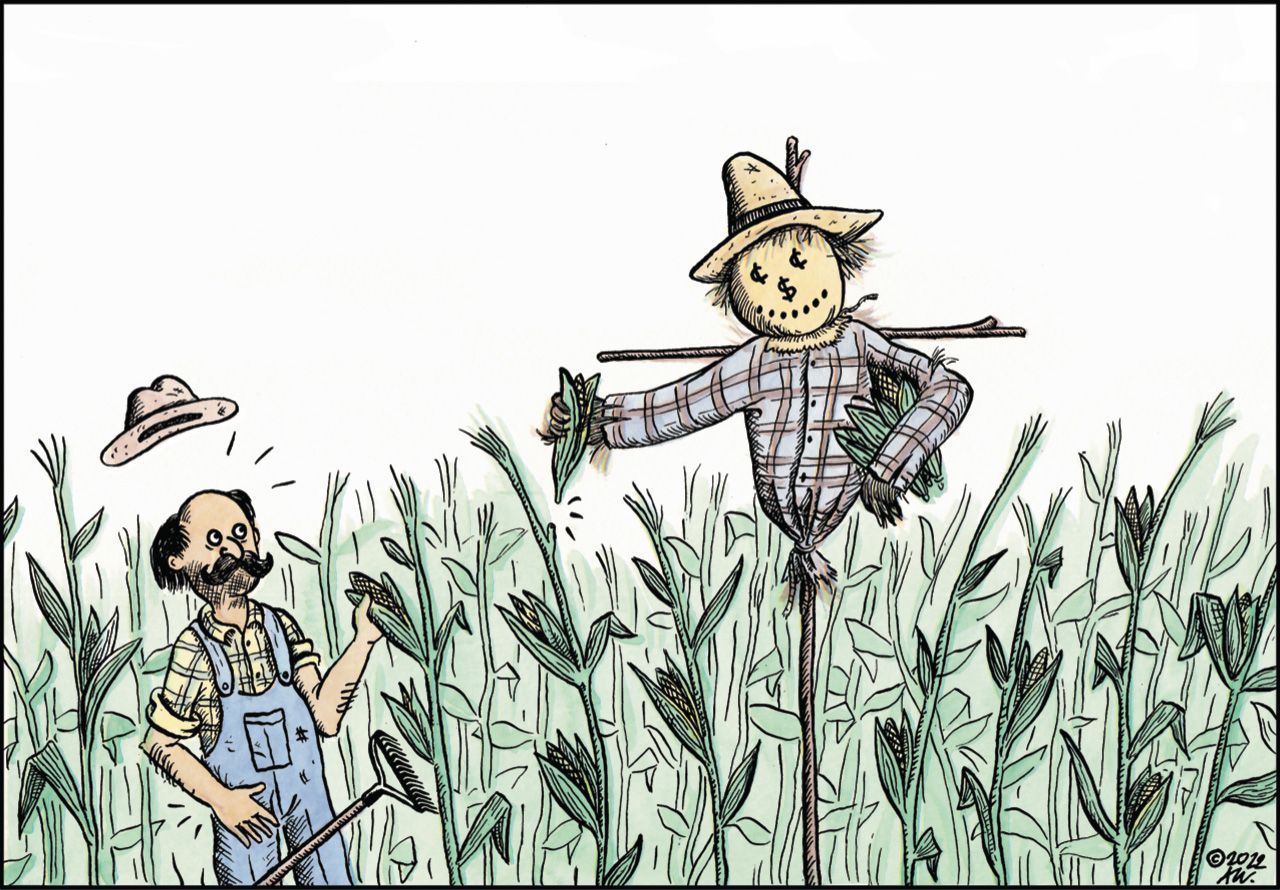‘Opus populus’ es la segunda parte de una serie de tres alegorías urbanas enfocadas en el cultivo institucional, las decadencias del sistema, y las organizaciones sin fines de lucro que abundan y forman parte del desarrollo social, económico, cultural, y humanitario de nuestra actualidad. En los estados unidos existen más de un millón de organizaciones benéficas que promueven y luchan distintas causas; es por eso que en la multicultural, en la variedad de estímulos, y en la facilidad con que muchos de estos líderes sociales logran adquirir los financiamientos, existen ciertas facilidades para el abuso, la corrupción, y la manipulación de estas instituciones que endurecen los corazones de los menos afortunados y enriquecen a una minoría rapaz.
Sentados se observan unos a otros afilados como al borde de la navaja; suben las trailas repletas de esculturas hacia las colinas empolvadas de la enorme cuenca adornada por el desierto. Las cabezas asoman sus dientes por el esfuerzo, las venas se les marcan en la frente y los vientres repletos de la contundente necesidad de superarse.
Así nuevamente, comienza la maquinaria a impulsar a sus pupilos. Es cierto y es bien sabido que la gran mayoría estamos en un país supuestamente 'ajeno', en una situación distinta cada una a todas las demás. No se puede hablar en plural cuando todos se han marchado en el paso que más suerte les acerco a vivir otro dia mas al otro lado de la pobreza o el temor al mundo mutante y peligroso — ese mismo mundo que alguna vez coloreaba sus sonrisas de la infancia, cuando todo era más sencillo, donde todo solo era jugar y volver al mediodia a casa de mama y papa. Hubo casos donde no pudo ser de esa manera; hubo quien desde la pequeña experiencia de ser pequeño tuvo que crecer, madurar más aún de lo debido, de lo querido, de lo esperado.
Opus populus: el trabajo de la gente. Existen distintas interpretaciones para esta frase, pero el enfoque es hacia el reconocimiento al constructor de sociedades — el proletario, el pequeño comerciante, líderes sociales, y políticos que dan su dia a dia tratando de ganar con fe desde abajo, y desde la posición social que mira hacia arriba con fuerza, con la ilusión de una posible oportunidad de escalar, para cambiar la suerte de muchos que lo necesitan. En ‘El Tótem’ hice alusión a todas esas entidades — organizaciones y dependencias sin fines de lucro que lucran con la pobreza, la necesidad, la ilusión, y sueños de todos aquellos que han caído víctimas de un sistema desfavorable.
Pero en este capítulo, quiero no solo contar la historia de la primera piedra de la humanidad, de la rueda o el fuego; quiero dejar claro que somos más de 7.8 mil millones, concentrados en naciones, reducidos a países, a estados, a ciudades, a colonias, a personas aisladas. Aportando el labor para mantener este progreso en la especie.
Aquí me encuentro nuevamente, pájaro en el alambre, cuervado (alusivo a un cuervo que grita todo lo que acontece):
“Y ese maiz? El que dicen que viene del granero? De donde chingados creen que viene? Apoco los maizales nacen solos, se cuidan solos, se cosechan solos? Aquí hay algo que no cuadra. Veo que ahi ustedes, desde su pedestal, cargan los costales llenos del grano destinado a alimentar mi pueblo.”
Ah qué granos! Ya ni los esconden, ya ni respeto le tienen al pobre; le miran y hacen de sus gestos una distinción social. Le apodan negocios a eso de llenar la barriga sin mirar a quien dejan con hambre.
El objetivo de la gárgola: desahogar las aguas sucias de las canaletas que se encuentran en las construcciones. Así como, existen otras que al igual han sido colocadas por los mismos hombres que le rinden tributo cada fin de mes. Estos hombres se apresuran entre las lluvias frías, que son rociados por las aguas sucias que emanan de las bocas fieras de estos hombres de piedra con sombras de demonio. Política.
"Dejen de hacerse pendejos!" exclamó de nuevo el cuervo que curveaba molesto entre los alambres de púas que encierran al público en general. "Claro que los veo y los veo bien; son tan obvios, que no dejan nada a la duda que se alimenta de esperanza."
Voló y no volvió. Separó su vida de esos molestos momentos cuando la sangre más que hervir se le cuajaba de coraje, de dolor.
Ese dinero mi gente, viene de nuestra mano que sangra, de nuestra historia que se oculta, de la injusticia que se almacena en los archiveros — la misma que encuentra culpables encubierto para no dejar de ver que la justicia es un bache que se rellena constantemente pero que erosiona siempre con el tiempo. Ese dinero es nuestra fe disfrazada de papel maché, nuestro sueño de noches incompletas, una apuesta en la cual no participamos, como ellos (y ellos somos nosotros). Así de distante estamos de ser reconocidos como parte de algo. De aquí.
El trabajo nunca se oculta, es imposible doblarlo. Existe sólo por la existencia humana, el control, la visión, el dolor, la medida. Pero, qué hace que esto sea tan precario? Es corrupción? La ignorancia? El miedo a rebelarse contra uno mismo y no contra el sistema?
Qué nos hace tan incapaces de respetar la paz, el esfuerzo, y lo excepcional?
Averigüemos el próximo mes en "Credo": la entrega final de esta serie de tres partes.
Sigue a Ulises en Instagram: @ulisesyairnavarro
Adam Whittier es un caricaturista e ilustrador que usa imágenes para explorar ideas complejas y problemas sociales. Instagram: @whittier_comix
Opus populus (Bilingüe/Bilingual)
‘Opus populus’ is second part of a series of three urban allegories focused on institutional cultivation, the decline of the system, and non-profit organizations that abound and are part of social, economic, cultural, and humanitarian development of our present. In the United States there are more than a million charitable organizations that promote and fight different causes; that is why in the multicultural, in the variety of stimuli, and in the ease with which many of these social leaders manage to acquire financing, there are certain facilities for the abuse, corruption, and manipulation of these institutions that harden the hearts of the less fortunate and enrich a rapacious minority.
Seated, they look at each other sharp as on the edge of a razor; they climb the trailers full of sculptures towards the dusty hills of the enormous basin adorned by the desert. Their heads show their teeth with the effort, the veins stand out on their foreheads and their bellies are full of the forceful need to excel.
Thus again, the machinery begins to drive its pupils. It is true and it is well known that the vast majority of us are in a supposedly 'alien' country, each one in a different situation from all the others. You cannot speak in the plural when everyone has been left in the step that brought them the luck to live another day on the other side of poverty, or fear of the dangerous and mutant world — that same world that once colored their smiles in childhood, when everything was simpler, where everything was just playing and returning to mom and dad's house at noon. There were cases where it could not be that way; there were those who had little experience of being children and had to grow, mature even more than they should, than wanted, than expected.
Opus populus: the work of the people. There are different interpretations for this phrase, but the focus is on recognizing the builder of societies — the proletarian, the small business owner, social leaders, and politicians who spend their day-to-day trying to win with faith from the ground floor, and from that social position, who look up strongly, with the illusion of a possible opportunity to climb, to change the luck of many who need it. In ‘The Totem’, I alluded to all those entities — non-profit organizations and agencies that profit from poverty, need, illusion, and dreams of all those who have fallen victim to an unfavorable system.
But in this chapter, I want to not only tell the story of humanity's foundation stone, of the wheel, or of fire; I want to make it clear that we are more than 7.8 billion, concentrated in nations, reduced to countries, states, cities, colonies, and isolated people. Contributing the work to maintain this progress in the species.
Here I am again, bird on the wire, crowed (alluding to a crow that screams at everything that happens):
“And that corn? The one they say comes from the barn? Where the hell do you think it comes from? Are cornfields born on their own, do they take care of themselves, are they harvested on their own? Here's something wrong. I see that there you, from your pedestal, carry the sacks full of grain destined to feed my people.”
Oh what grains! They don't even hide them anymore, they don't even have respect for the poor anymore; they look at them and make their actions a social distinction. They fill their bellies without looking at who they leave hungry and call it doing business.
The objective of the gargoyle: to vent the dirty water from the gutters found in the buildings. There are others that have been placed by the same men who pay tribute at the end of every month. These men rush through the cold rains, which are sprayed by the dirty waters that emanate from the fierce mouths of these stone men with demon shadows. Politics.
"Stop being stupid!" the crow exclaimed again, agitatedly curving between the barbed wires that enclose the general public. "Of course I see them and I see them well; they are so obvious that they leave nothing to doubt that which feeds on hope."
He flew away and did not come back. She separated her life from those annoying moments when her blood curdled more than boiled with anger, with pain.
That money, my people, comes from our hand that bleeds, from our history that is hidden, from the injustice that is stored in the archives — the same one that finds hidden culprits so as not to stop seeing that justice is a pothole that is constantly being filled but that always erodes with time. That money is our faith disguised as papier-mâché, our dream of incomplete nights, a bet in which we do not participate, like them (and they are us). That's how far we are from being recognized as part of something. From here.
The work is never hidden, it is impossible to fold it. It exists only because of human existence, control, vision, pain, measure. But what makes this so precarious? Is it corruption? The ignorance? The fear of rebelling against oneself and not against the system?
What makes us so incapable of respecting peace, effort and the exceptional?
Let's find out next month in "Credo": the final installment of this three-part series.
Follow Ulises Navarro on Instagram: @ulisesyairnavarro
Adam Whittier is a cartoonist and illustrator who uses pictures to explore complex ideas and social issues. Instagram: @whittier_comix


